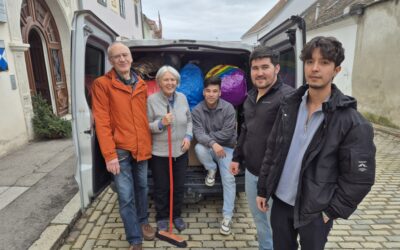Replay streaming event: http://live.focolare.org/
 The main objective of “Learning Fratenity”, held at Castel Gandolfo, Rome from 6th to 8th September, is to share good practices and initiatives implemented in different cultural contexts to obtain from them shared pedagogical lines of conduct leading to fraternity and peace. The 650 educators from 35 countries attending this conference will participate in lectures, in the sharing of good practices and in workshops. Stands will also be set up.
The main objective of “Learning Fratenity”, held at Castel Gandolfo, Rome from 6th to 8th September, is to share good practices and initiatives implemented in different cultural contexts to obtain from them shared pedagogical lines of conduct leading to fraternity and peace. The 650 educators from 35 countries attending this conference will participate in lectures, in the sharing of good practices and in workshops. Stands will also be set up.
This conference assumes particular significance at a time when Pope Francis voices “the cry for peace” uttered by “ the one big family of humanity”. The promoters of this conference say this in a letter they wrote to the Pope.
Those involved in the daily task of educating, no matter at what level – families, schools, group leaders, academics, the youngsters themselves – will be the protagonists of this meeting.
The three experts, who will speak about “Education and Globalization” and its connotations in Latin America, Africa and Europe are: Nieves Tapia, coordinator of the National Programme of Education in collaboration with the Ministry of Education, Science and Technology in Argentina; Justus Mbae Gitari, Professor of Pedagogy at the Catholic University of Eastern Africa in Nairobi; Giuseppe Milan, Professor of Intercultural and Social Pedagogy at the University of Padua.
Paula Luengo Kanacri, from Chile, a researcher at CIRMPA, La Sapienza University, Rome and Teresa Boi, an Italian teacher and educator will lecture on “Education and Relation”.
A range of subjects will be dealt with during the workshops: from the culture of legality to parent-child relationship; from the prevention of bullying to new media communication; from social integration to opening the school to the city, from sports to dance.
 Good practices carried out in cultural contexts of 20 different countries, amongst them Congo, Pakistan, Colombia and Eygpt will be presented through the setting up of stands.
Good practices carried out in cultural contexts of 20 different countries, amongst them Congo, Pakistan, Colombia and Eygpt will be presented through the setting up of stands.
The school “Café con Leche” started under a tree in one of the poorest areas in the city of Santo Domingo. Presently it caters for 500 children, who learn to discover themselves and others through the diversity and richness of ethnic groups.
The project “Peace begins with me” was started in Eygpt, and today it involves another 40 countries with more than 1500 students, teachers and heads of 82 schools, that promote the International Festival for Peace.
In Italy, “Project Peace” has been pursuing initiatives for 23 years, arousing interest in 100,000 young people in 400 schools, networking with others from Eastern European countries through annual humanitarian trips, solidarity shown to countries struck by war or disasters, interaction with foreigners and with persons who have different abilities.
On Saturday September 7, a live streaming transmission is scheduled. (http://live.focolare.org). Ideally, the programme will be linked with the day of fasting and prayer launched by Pope Francis for peace in Syria and in the world.
This conference-workshop is being promoted by New Humanity (an NGO with a general consultative status at ECOSOC of UNO) together with 4 other educational agencies of the Focolare Movement: the Umanita` Nuova Movement, EDU (Education and Unity), AMU ( the NGO – Action for a United World) and Teens4Unity.
This event is honoured by the patronage of Italian National Commission for UNESCO.




0 Comments